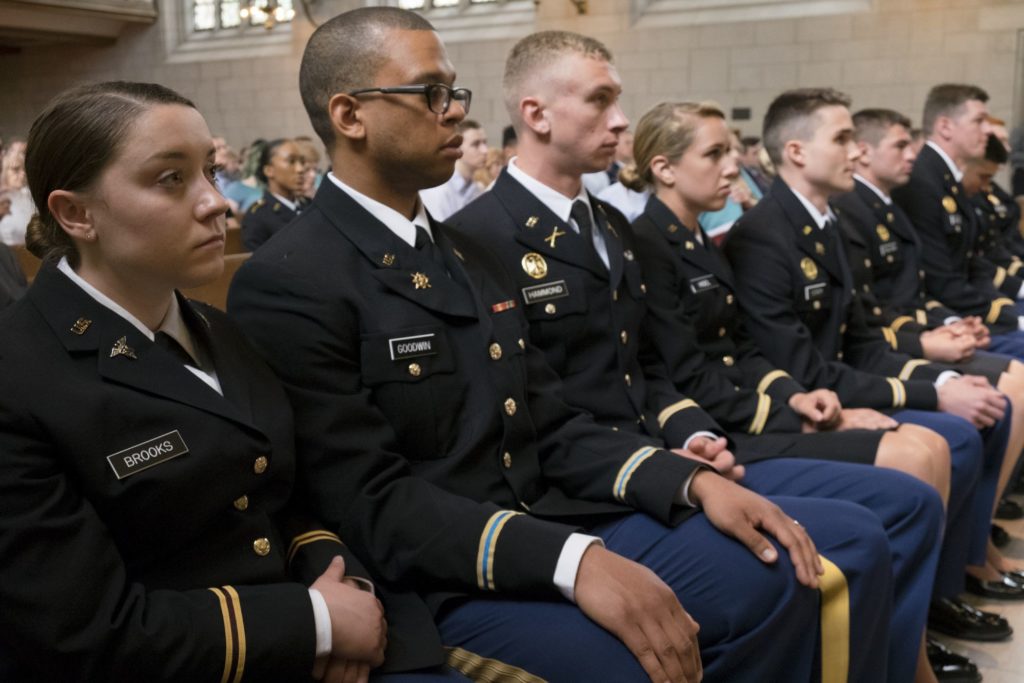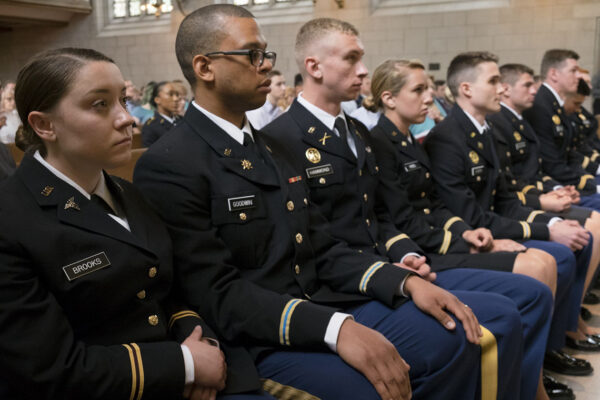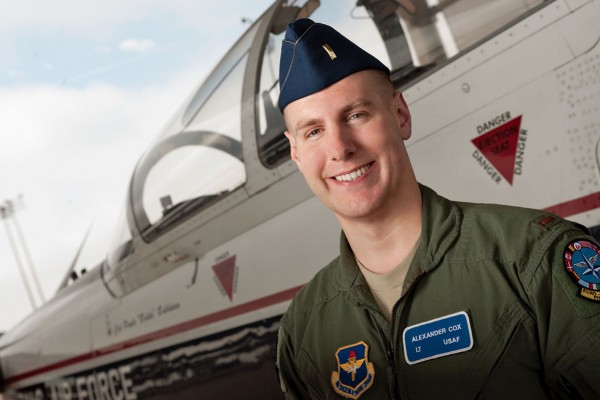Fifty years ago, students across the nation fiercely debated whether the Reserve Officers’ Training Corps (ROTC) programs belonged on college campuses.
Today, Washington University in St. Louis Provost Holden Thorp says there is no better place.
“ROTC is incredibly important to higher education,” Thorp said. “The creation of ROTC more than 100 years ago was, itself, a recognition that liberal education is a great way to train people for leadership.”
Thorp delivered that message at the spring 2018 Gateway Battalion Commissioning Ceremony, which marked the 100th anniversary of ROTC at Washington University. The milestone is significant for a program that, at various moments, has been denounced by students, faculty, LGBT advocates and, even, the U.S. Department of Defense. But for the graduating cadets from the region’s Gateway Battalion — six from Washington University, five cadets from other local universities — the ceremony was a celebration of both friendship and accomplishment. Every member of this close-knit group had been awarded the assignment of their choice, a rare achievement for a ROTC battalion.
“The rigors of the Gateway Battalion and WashU have brought out a lot in all of us,” said Conor Hammond, AB ’18, who will attend Ranger School this summer before his first active duty assignment. “I don’t think any of us recognized what we had inside when we arrived here. But for four years, we have motivated each other, learned from each other and taken care of one another.”
The cadets stood proudly as family members pinned gold second lieutenant bars onto their uniforms. The students then received their first salutes from a noncommissioned officer of their choosing. For four cadets, including Hammond, that officer was Staff Sergeant Travis Wyrick, a member of the Battalion’s cadre of seven staff members based on Washington University’s North Campus. After serving in Afghanistan, Iraq and Kuwait as well as at bases across the United States, Wyrick was assigned in 2015 to the Gateway Battalion to provide training in the classroom and in the field for 120 students from Washington University and eight other local universities.
“There is something special about the cadets I’ve met here. Their maturity, their intelligence, their commitment to be leaders in their communities, it’s mind-blowing — and so important for our nation.”
— Travis Wyrick
“There is something special about the cadets I’ve met here,” Wyrick said after the ceremony. “Their maturity, their intelligence, their commitment to be leaders in their communities, it’s mind-blowing — and so important for our nation.”
Students revolt against ROTC
Yet, the ROTC program has deeply divided the Washington University community over the years. In the late 1960s, students considered ROTC complicit in the Vietnam War and staged protests and sit-ins in Brookings Hall. Ultimately, a university committee determined ROTC could remain on campus but recommended that cadets no longer earn academic credit for their ROTC course work.
Still, tensions raged. Students continued to protest and Arts & Sciences approved a resolution calling for the end of ROTC. On Feb. 23, 1970, a mysterious fire destroyed the Army ROTC building near the current Athletic Complex. A few months later, tensions exploded when the National Guard killed four students at Kent State on May 4. That night some 2,500 angry Washington University students rushed toward the Air Force ROTC building and started chanting “Kent State, Kent State.” Some 30 students then charged the building and set it ablaze.
At the time, Chancellor Thomas Eliot declined to speak to the media, but he did have this to say to members of the Eliot Society: “The university still stands. It stands. And, as it always has, it stands for the unterrified and unconfined search for truth. … As we gird to protect our beloved institution from the felonies of the few, we must also protect the freedom of the many — professors and students alike — to dissent, to criticize, to engage in intellectual controversy, to work together with minds unfettered and unafraid.”
The program continued with the Air Force ROTC program moving to St. Louis University and the Army ROTC relocating to the Academy Building on University Drive. But another high-profile conflict erupted in 1990, when the Army demanded cadet James Holobaugh, BSCE ’90, who was a student in the School of Engineering & Applied Science, repay his ROTC scholarship after he revealed to ROTC officials that he was gay. Washington University supported Holobaugh, writing to the school’s ROTC commander that the Army’s ban against gays in the military was in conflict with the university’s own anti-discrimination policy. Ultimately, the Army reversed its decision and later “Don’t Ask, Don’t Tell” was officially repealed. Today, the Holobaugh Honors awards recognize Washington University students, staff, faculty and St. Louis community members who serve LGBTQIA communities through artistic expression, activism, leadership or academic exploration.
Then four years later in 1994, the Department of Defense declared it would cease Washington University’s ROTC program as well as the ROTC programs at 17 other universities. Sen. John Danforth, brother to then-Chancellor William H. Danforth, added an amendment to the defense appropriations bill that spared the Gateway Battalion.

Big investment, the best cadets
Today, the Army ROTC program rebounded, gaining new members and respect. The university has expanded its efforts to recruit and support ROTC cadets. In 2014, only 14 Washington University students participated in ROTC. Today, 41 of the Gateway Battalion’s 120 cadets are Washington University students. Last year, the federal government provided more than $2 million in tuition aid to Washington University cadets.
Lt. Col. Matt Snell, who leads the battalion’s 12-person staff, credits Chancellor Mark S. Wrighton and Thorp for the university’s stepped-up support, both financially and academically. In 2015, the university announced it would provide every cadet with a ROTC scholarship free room and board. That’s an investment of $480,000 compared to $67,000 in 2014.
“That’s a win-win for everyone. The cadets get a top-notch education at one of the nation’s best universities. Washington University is enriched by these talented, dedicated leaders. And our nation is strengthened by officers who are prepared to meet complex, global challenges.”
— Lt. Col Matt Snell
“That’s a win-win for everyone,” said Snell. “The cadets get a top-notch education at one of the nation’s best universities. Washington University is enriched by these talented, dedicated leaders. And our nation is strengthened by officers who are prepared to meet complex, global challenges.”
And this year, three-year ROTC scholarship winners may also receive free room and board for their first year on campus. The support, coupled with ROTC’s tuition benefit, makes Washington University one of the most attractive elite universities for future officers.
And in 2014, three university schools — the College of Arts & Sciences, Olin Business School and the School of Engineering & Applied Science — restored academic credit for some ROTC classes. It’s a big deal to ROTC cadets who will spend hundreds of additional hours at morning physical training, military science classes, leadership labs, field exercises and summer programs. A popular program among Gateway Battalion cadets is the Cultural Understanding and Leadership Program (CULP) where cadets immerse themselves in a foreign culture to learn how to interact with people with different backgrounds and beliefs, study a new language and understand how other societies view the United States.
“The quality of our cadets is very much a result of the investment the university has made —and not just monetarily,” Snell said. “Every day we’re presented with new opportunities to collaborate with university departments and faculty to enrich the our cadets’ academic and leadership experiences.”
One such cadet was graduate Teddy Sims who, in 2016, was awarded the Truman Scholarship, one of the most prestigious and selective scholarships in higher education. As the battalion’s cadet executive officer, Sims traveled to France, Italy, Tanzania and Morocco, where he developed a “smart book,” an easy-to-read guide to the nation’s language, customs and politics.
“To reach our objectives, we must understand the values, the priorities and the cultures of the people we encounter. Ultimately, it’s the human interactions that will define our outcomes.”
— Conor Hammond
“Operational readiness and tactical proficiency matter, but understanding language and culture must be priorities too,” said Sims, AB ’17, who majored in international and area studies and studied Swahili. “I believe in listening to people and learning their stories. If we don’t understand the people we are working with, whether that person is a village elder or a commander, how can we be successful?”
Hammond, who also majored in international & area studies, shares Sims’ philosophy. He traveled to Madagascar for his CULP training and speaks Spanish, French and Arabic.
“To reach our objectives, we must understand the values, the priorities and the cultures of the people we encounter,” Hammond said. “Ultimately, it’s the human interactions that will define our outcomes.”
Diane Toroian Keaggy, AB ’90, is senior news director of campus life.


